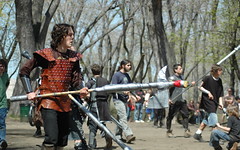| Play by post gaming is sort of the opposite of this, thank goodness. (Photo credit: mricon) |
As I mentioned, though, a few weeks ago I decided to give it a go. Whoever runs the twitter feed for DnDOG followed me on twitter, so I decided to check them out. I found an amazingly vibrant community of roleplayers playing all kinds of games, though it's mostly DnD 3.5 and Pathfinder, with the occasional 4e game thrown in for good measure. I lucked into joining a 4e game with my first application, and have been hooked ever since.
My experience has been rather unlike what was described at Exemplary DM. There certainly has been plenty of writing, and I'm fortunate to be playing with several fantastic writers (including the DM). The only time I can remember trying to write dialog since eighth grade was when I was working on my nwn2 character creator module, and I've found it to be both fun and challenging. Even a few paragraphs have taken me a very long time to write in the early going, but I think I'm getting faster as I find both my voice and that of my character. I'm playing a fairly quiet character, and that's worked out well, as I don't need to take the lead in conversations...and any awkwardness fits his character pretty well. :) Nevertheless, we're definitely still playing DnD. The forums at DnDOG have a nice dice-rolling mechanism that permits you to embed honest dice rolls into your posts for skill checks and, of course combat. This tool permits players and DMs to run a game that feels very dnd. Right now, we're meeting the Baron of a small city, and my character has been rolling perception and insight checks left and right, while the talky-talky PCs are rolling diplomacy, bluff, intimidate, etc, as needed to interact with the NPC's. The DM wisely places substantial modifiers on roll outcomes based on the roleplaying. Therefore, if you roll a good diplomacy check, but write an insulting, uninspiring dialog you'll likely encounter a penalty...and similarly, if you roll badly but roleplay well, you might well succeed in the check. And some of the time, you won't even know if you've succeed--you just go with what the DM gives you. It's very immersive, and yet it's still driven by in almost equal parts by the character sheet and the player behind the character.
We also did a small combat, which I found to work very well. It plays very closely to how it might on a table, with a few exceptions. First, while everyone rolls initiative, the monsters all tend to go as a group, as do the PC's. This allows all of the PC's to post their turn as time permits, without having to wait for whoever is in front of you to finish. After each turn, our DM updates the grid (which he draws on his computer, in powerpoint I'm guessing?), and gives us reports of the monster conditions and such. The actual combat is delivered in character, but with lots of out of character references to character actions and statuses. Again, the forum software is great for because it allows you to hide or otherwise disguise these out of character elements within the game thread to clearly separate them from the roleplay. It even lets you post secret information that is just between the DM and the player.
There are some downsides combat. First, it is a bit harder to play a controller under this framework. For example, one of my Hunter's best abilities is the ability to slide enemy PC's two squares with a damage-dealing, at-will attack. One use for this might be to move "squishy" spellcaster-types closer to the front lines, and I'll certainly do that. But another use will be to move foes into a position where they can be easily flanked. If I'm doing this, I need to be really careful about who has already posted and who has yet to post as I execute the maneuver. If "my" strikers have already posted that round, that tactical option is more or less often off the table. But given how much the "everyone goes at once" framework speeds up combat, I think it's a worthwhile trade-off.
The second downside, of course, is that because we're playing within the constraints of eight individuals' schedules, play by post is kind of slow. Or, rather, it's bursts of activity followed by long periods of waiting. As it's summer and I'm not teaching, now is a great time for me to be playing. Therefore, I've submitted applications for a couple of other games. As the semester starts up again in the fall, I'll see about reducing my commitments as needed. Probably, it will just mean that I'm posting a bit less often than I am now. And that's fine, as most games only ask for 3-5 posts per week.
Over the next few days, I'll post a few of the other characters I've written up for applications. I don't know who will read them, but they were fun to write. :)


Great summary of PbP. It does have some drawbacks, but for those of us that can't commit to a weekly or bi-weekly meeting time for a table-top DnD game, it's the next best thing. And in some ways (character development being one of them), PbP is far better. I'm really glad that you decided to give it a shot! Thanks, Berliad!
ReplyDelete-your DM :)
Thanks for dropping by, Enthusiast! Like I said, I'm having a blast playing your game. The thing I'm most excited about is that I actually get to play DnD. That just wasn't possible before now, beyond what I could do with kids or video games.
ReplyDelete